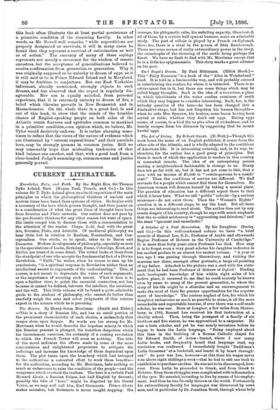The Sowers. By Henry Seton Merriman. (Smith and Elder.) —This
is a story of Russian life, and has no small portion of the prominent characteristic of such stories, a melancholy that verges close upon despair. No words are too strong for Mr. Merriman when he would describe the hopeless misery in which the Russian peasant is plunged, the heartless despotism which his Government exercises, the certainty of a coming revolution to which the French Terror will seem as nothing. The title of the novel indicates the efforts made by some of the more conscientious and enlightened proprietors to mitigate the sufferings and increase the knowledge of those dependent upon them. The plot turns upon the treachery which had betrayed to the authorities a concerted effort to work these benefits— for the authorities, according to Mr. Merriman, hate nothing so much as endeavours to raise the condition of the people—and the vengeance which overtook the traitors. The hero is a certain Paul Howard Alexia, a Russian Prince, but half English by descent; possibly the title of "hero" might be disputed by his Grand Vizier, as we may well call him, Karl Steinmetz. Prince Alexis makes mistakes, but Steinmetz is never caught napping. His
courage, his phlegmatic calm, his unfailing sagacity, illuminated, all of them, by a certain half-cynical humour, make an admirable study. The part of villain is played by a French ex-diplomat. Here, too, there is a rival in the person of Etta Bamborough. There are some scenes of really extraordinary power in the story, the catastrophe of the storming of the castle being perhaps the finest. We have no fault to find with Mr. Merriman except that he is a little too epigrammatic. This story marks a great advance on his part.


































 Previous page
Previous page